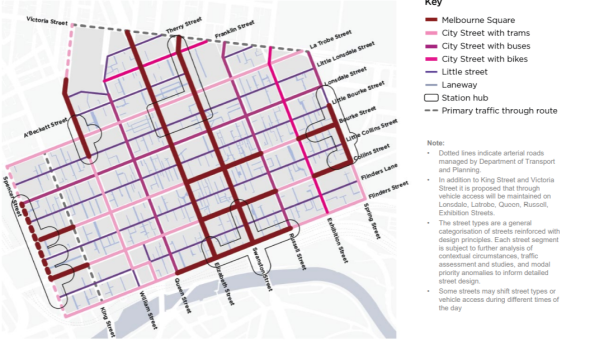Melbourne City Council is considering a plan which, if approved, will see pedestrians given significant priority over cars in the city’s CBD.

The draft Future Streets Framework will be presented to Council’s Future Melbourne Committee on June 6.
The framework aims to establish a long-term vision for the Hoddle Grid – the name given to the network of streets that form the city’s central business district – including making it greener and more pedestrian-orientated.
“The framework recognises that not all transport modes can exist in a constrained street, and streets must also accommodate other features which contribute to high quality, functional and prosperous places,” the committee will be told.
It proposes six classifications for city streets, including:
- squares (major city gateways near key transport hubs and city attractions)
- city streets with trams
- city streets with buses
- city streets with bikes
- little streets (pedestrian-centric places with raingardens, trees and public art)
- laneways (supporting business and creativity)

Embedding sustainability
The framework seeks to embed environmental sustainability into the future CBD via active transport, urban cooling and open spaces.
It aligns with City of Melbourne’s Transport Strategy 2030, which aims to cut the proportion of central city through-traffic by half, and increase public transport, walking and cycling share to 70 per cent of all trips.
Lord Mayor Sally Capp said with major projects like the Metro Tunnel expected to bring more than half a million more passengers into the City each week, the framework prioritises safe pedestrian movement around transport hubs.
“The Framework will help us deliver streets that work for our city, from efficient traffic flow and safer pedestrian zones, to enhanced public transport hubs,” she said.
“The majority of trips completed within the Hoddle Grid are on foot, so we’re particularly focused on making our streets as safe for pedestrians as possible.”
Proposes framework essential for health of city
The framework document says a safe, convenient, comfortable and accessible network of streets is essential for the function, growth and health of the city.
Strategies include redesigning streets to reallocate space for walking, narrowing traffic lanes, removing kerbs, reallocating on-street parking for pedestrians, converting streets to pedestrian priority zones and reducing the number of non-essential vehicles.
The framework also proposes improving streetscapes via greenery, street furniture, outdoor dining and public transport infrastructure as well as a “comprehensive and continuous bicycle network”.
It backs micromobility as a widely adopted way for people to move about the city efficiently.
“Given this broad user base, currently and into the future, it is important that streets are planned to manage this,” it says.
If endorsed, the community will be able to have their say on the framework from June 7.
A final framework will be presented to Council later this year.





If Melbourne can do this. Perhaps Sydney has a hope!